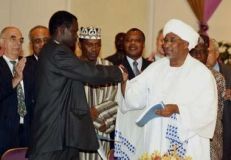Sudan, Darfur rebel SLA-Minawi sign peace deal
May 5, 2006 (ABUJA) — The government of Sudan and the main Darfur rebel faction signed a peace agreement on Friday to end three years of fighting that has killed tens of thousands of people and forced 2 million to flee their homes.
 Majzoub al-Khalifa, head of the government’s negotiating team, and rebel Sudan Liberation Army (SLA) faction leader Minni Arcua Minnawi signed the deal in the Nigerian capital Abuja after days and nights of intense talks under global pressure.
Majzoub al-Khalifa, head of the government’s negotiating team, and rebel Sudan Liberation Army (SLA) faction leader Minni Arcua Minnawi signed the deal in the Nigerian capital Abuja after days and nights of intense talks under global pressure.
“We are reaffirming that the fighting ends now in Darfur … We shall go ahead with peace and we shall be serious,” Minnawi said at a signing ceremony at the Nigerian presidential complex.
Rebels took up arms in early 2003 in ethnically mixed Darfur, a region the size of France, over what they saw as neglect by the Arab-dominated central government.
Khartoum used Janjaweed militias drawn from Arab tribes to crush the rebellion. A campaign of arson, looting and rape has caused a humanitarian catastrophe in Darfur and the United States labels the violence there “genocide”.
The peace agreement, which covers security, wealth-sharing and power-sharing, is the result of two years of painstaking negotiations mediated by the African Union (AU).
Two other rebel factions refused to sign, complaining that the document fell short of their basic expectations. Diplomats said this could pose problems in the implementation phase.
“There will be tests because not all have shown courage and leadership today,” said U.S. Deputy Secretary of State Robert Zoellick at the signing ceremony. “Those parties are bound by the ceasefire as all are,” he added.
The rebels who refused to sign also risk U.N. sanctions such as travel bans or a freeze on assets.
Three deadlines had passed without an agreement since Sunday because all the rebels had rejected the original AU draft.
To break the deadlock, an international team of diplomats led by Zoellick flew in over the last few days to extract a few extra concessions to the rebels from the government.
They obtained specific commitments to ensure the disarmament of the Janjaweed and stronger provisions for the integration of rebel fighters into Sudanese security forces.
FORMER FOES EMBRACE
These breakthroughs helped persuade Minnawi to sign the deal at the end of a nerve-wracking week, but they were not enough to convince Abdel Wahed Mohammed al-Nur, leader of a rival SLA faction, or the smaller Justice and Equality Movement (JEM).
Diplomats had said all along it was most important to persuade Minnawi to sign as he controls more SLA fighters than Nur, while JEM is marginal in terms of forces on the ground.
Nevertheless, Zoellick, Nigerian President Olusegun Obasanjo and other leaders and diplomats tried until the last minute to coax Nur into signing, delaying the ceremony by several hours.
Their efforts failed, but a group of members of Nur’s faction who were upset with him for refusing to sign burst into the signing ceremony as it was almost ending and said they wanted to be associated with the peace agreement.
In an emotive moment, the breakaway members of the Nur faction embraced Minnawi, their former rival, and Khalifa, the government chief, while elderly Darfur tribal leaders in traditional robes and turbans cheered and chanted.
It is uncertain whether the agreement will translate into peace on the ground in Darfur.
A ceasefire has been in place since April 2004 but the AU, which has 7,000 peacekeepers in Darfur, says all sides have continued fighting.
Obasanjo and all the other speakers at Friday’s signing event emphasised that implementation of the deal was the key.
“Unless the right spirit is there, the right attitude, this document will not be worth the paper it’s written on. The spirit that led to the signing should continue to guide the implementation,” Obasanjo said in his opening speech.
Western governments have called for the AU peacekeeping mission in Darfur to be turned over to the United Nations but the government in Khartoum has said it would only consider U.N. troops after a peace agreement.
U.N. humanitarian chief Jan Egeland said access for aid workers in Darfur is at its worst level in two years.
“I first spoke to the U.N. Security Council on Darfur two years ago, calling it ethnic cleansing of the worst kind. Today, I could simply hit the rewind button on much of that earlier briefing,” he wrote in an editorial on Friday.
(Reuters)
